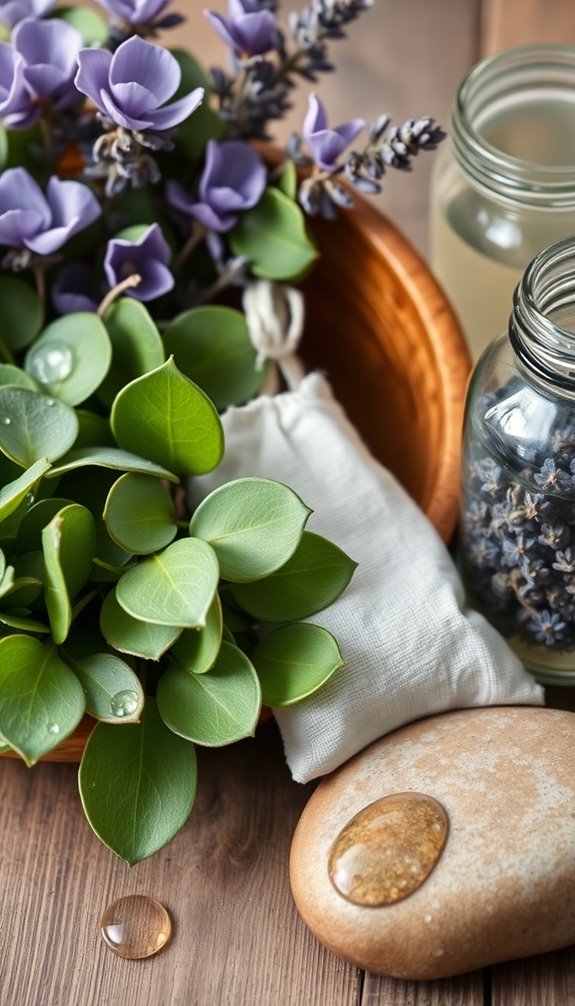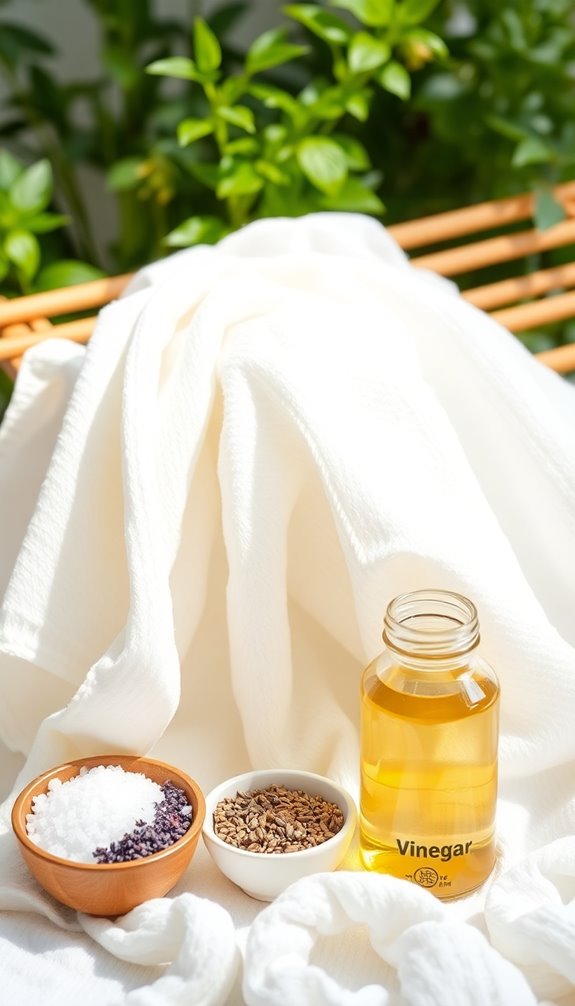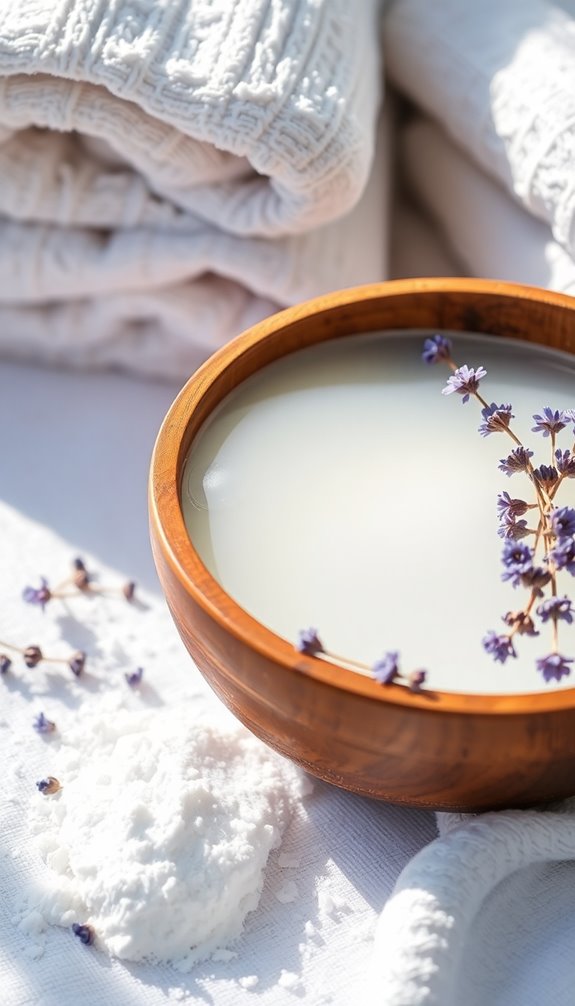You can easily ditch traditional fabric softeners for natural alternatives that soften your laundry without harmful chemicals. Try using wool dryer balls, as they reduce drying time and soften fabrics naturally. Adding distilled white vinegar to your rinse cycle helps break down detergent residues and eliminates static cling. Baking soda also works to enhance cleaning and softness. For a nice scent, infuse a few drops of essential oils into dryer balls or use soap nuts for an eco-friendly option. Curious about the full range of benefits these alternatives offer? There's so much more to explore!
Understanding Fabric Softeners
When you toss your laundry into the washer, you might reach for fabric softener to make your clothes feel cozy and fresh. These products are designed to coat fabric fibers with synthetic ingredients, softening clothes and reducing friction. They often contain cationic surfactants that help eliminate static cling and wrinkles while leaving garments smelling pleasant.
However, fabric softeners can also leave behind chemical residues that diminish absorbency and breathability, especially in items like towels and athletic wear. Regular use of eco-friendly products can help maintain the quality of your fabrics without harmful effects. Additionally, opting for natural alternatives aligns with sustainable practices that benefit the environment.
You should be aware of potential health concerns associated with these products. Many fabric softeners contain fragrances and harmful chemicals, such as phthalates, which may trigger allergic reactions or skin irritations.
In addition, the synthetic ingredients in these softeners contribute to environmental pollution, as they're typically non-biodegradable and can harm aquatic ecosystems.
If you're looking for natural alternatives, consider options like vinegar or baking soda to soften your laundry without the unwanted side effects. Non-toxic cleaners can provide effective and safe solutions for both laundry and household cleaning.
These alternatives not only soften clothes but also minimize health risks and reduce your ecological footprint. By choosing wisely, you can keep your laundry fresh while being kinder to both your health and the environment.
Risks of Traditional Softeners
Traditional fabric softeners come with a range of risks that can impact both your health and the environment. You mightn't realize that these products often contain harmful chemicals like quaternary ammonium compounds (QACs), which are linked to respiratory issues and skin irritation.
Additionally, the synthetic fragrances used in traditional fabric softeners can trigger allergic reactions and exacerbate asthma symptoms, especially in sensitive individuals.
Here are four key risks to evaluate:
- Residue Buildup: Fabric softeners leave a coating on fabrics, which can reduce absorbency, making towels and athletic wear less effective. Non-toxic formulas are an excellent alternative for maintaining fabric quality without harmful residues. Moreover, many eco-friendly cleaners, such as Seventh Generation, provide effective cleaning without the negative impact of traditional products.
- Health Concerns: The chemicals in these products contribute to respiratory issues and skin irritation, posing risks to your well-being.
- Environmental Impact: Many fabric softeners are non-biodegradable, leading to waterway pollution that threatens aquatic life as they enter ecosystems, which is similar to the harmful effects of traditional cleaners that contribute to water pollution.
- Flammability: Research shows that fabric softeners can increase the flammability of fabrics, raising safety concerns for everyday laundry.
Natural Fabric Softener Alternatives

When you're looking for natural fabric softener alternatives, consider wool dryer balls, vinegar, and essential oils. Wool dryer balls can soften your clothes and cut down drying time, while a splash of vinegar in the rinse cycle helps reduce static and break down detergent residues. Plus, adding a few drops of essential oils can give your laundry an invigorating scent without any harsh chemicals. Additionally, using vinegar as a natural fabric softener can leave your clothes feeling soft and fresh. Regular use of these natural alternatives can also minimize exposure to harmful chemicals found in conventional fabric softeners. Moreover, vinegar helps eliminate bacteria and fungi in your laundry, ensuring a cleaner and fresher result.
Wool Dryer Balls Benefits
Wool dryer balls offer a fantastic alternative to conventional fabric softeners, providing numerous benefits that enhance your laundry experience.
By choosing wool dryer balls, you can enjoy a more efficient and healthier way to do laundry. Here are some key advantages:
- Reduce drying time: Wool dryer balls can cut drying time by up to 25%, making your laundry routine more energy-efficient.
- Minimize static cling: They release humidity into the dryer, helping to reduce static cling and wrinkles in your clothes.
- Soften fabrics: These durable balls naturally soften fabrics without the need for chemicals in conventional fabric softeners.
- Hypoallergenic & reusable: Made from 100% natural wool, they're hypoallergenic, making them a safe choice for sensitive skin, and they can last for over 1,000 loads!
Using Vinegar Effectively
For a simple and effective way to soften your laundry, consider using vinegar as a natural alternative to fabric softeners. Adding 1/4 cup of distilled white vinegar to the wash cycle can greatly soften clothes and help remove detergent residues, enhancing the overall fabric feel without introducing harmful chemicals.
If you want to tackle static cling and lint buildup, use 1/2 cup of vinegar in the rinse cycle. This makes your clothes easier to manage after drying.
Vinegar also acts as a natural deodorizer, neutralizing odors in fabrics and leaving them fresh without synthetic fragrances. Thanks to the acetic acid in vinegar, it breaks down mineral deposits found in hard water, improving detergent effectiveness and fabric softness overall.
If you're looking for a pleasant fragrance, consider infusing your vinegar with herbs or citrus peels. This way, you can enjoy a delightful scent while still benefiting from vinegar's natural softening properties.
Essential Oils for Fragrance
Essential oils offer a delightful way to infuse your laundry with natural fragrance, transforming the mundane task of washing into an invigorating experience. By using high-quality, organic essential oils, you can avoid synthetic chemicals while enjoying a fresh aroma in your dry laundry.
Here are some popular options:
- Lavender – Known for its calming scent and potential antibacterial properties.
- Lemon – Provides a bright, uplifting fragrance and can help eliminate odors.
- Tea Tree – Offers a revitalizing aroma while also boasting antibacterial benefits.
- Eucalyptus – Adds a crisp scent and may help reduce static cling.
Simply add 3-5 drops of your chosen essential oil to wool dryer balls or a fabric softener dispenser. This small amount can effectively scent an entire load, allowing you to adjust the fragrance intensity to your liking.
Not only do these oils impart a wonderful natural fragrance, but they also help lubricate fabric fibers, making them ideal fabric softener alternatives.
Embrace essential oils in your laundry routine for a fresher, healthier experience without harmful additives.
Effectiveness of Natural Options
Natural alternatives to traditional fabric softeners can be surprisingly effective in enhancing your laundry experience.
Wool dryer balls, for instance, can reduce drying time by up to 25%, soften fabrics, and minimize static cling without the use of harsh chemicals.
If you add 1/4 cup of distilled white vinegar to your wash cycle, you'll not only soften clothes but also neutralize odors and break down detergent residues.
Baking soda is another fantastic option; it enhances the cleaning power of your eco-friendly detergent while softening fabrics without causing irritation.
You can also incorporate essential oils into your laundry routine by infusing them into dryer balls or adding them to the fabric softener dispenser, giving your clothes a pleasant, natural fragrance.
Lastly, consider using soap nuts.
These eco-friendly detergent alternatives contain saponins that clean and soften fabrics simultaneously, making them effective for laundry care. Additionally, using natural cleaning solutions, like vinegar and baking soda, can also help maintain a cleaner laundry routine.
Environmental Impact of Softeners

While exploring effective natural alternatives to fabric softeners, it's important to contemplate the environmental impact of traditional options.
Fabric softeners often contain harmful chemicals that can contaminate waterways, leading to significant ecological disruption and negatively affecting aquatic life. Their non-biodegradable nature contributes to long-term environmental pollution, complicating waste management and increasing landfill burdens.
The production and disposal processes of conventional fabric softeners add to greenhouse gas emissions, exacerbating climate change. Additionally, studies show that chemical residues from these products can accumulate in fabrics and wash water, potentially harming ecosystems when laundered items are disposed of or washed again.
By choosing eco-friendly alternatives, you can help mitigate these issues.
Here are some benefits of making the switch:
- Reduces reliance on harmful chemicals.
- Promotes sustainable practices that protect the environment.
- Enhances personal health by avoiding toxic substances.
- Supports the well-being of aquatic life and ecosystems.
Embracing these alternatives not only helps preserve our planet but also leads to a healthier lifestyle.
It's a win-win for you and the environment!
Tips for Using Alternatives
When you switch to natural alternatives for fabric softeners, a few simple tips can make a noticeable difference in your laundry routine.
Start with small amounts of vinegar or baking soda to gauge their effectiveness without overwhelming your laundry. These ingredients can help improve fabric softness and reduce static cling.
To add a pleasant scent, experiment by incorporating a few drops of essential oils, like lavender or lemon, into your wool dryer balls or vinegar. This guarantees your laundry smells fresh without the synthetic fragrances found in traditional softeners.
It's also vital to monitor the drying process. Reducing dryer time helps maintain softness while preventing over-drying, which can damage your fabrics.
Consider using eco-friendly detergents that naturally soften clothes; they can further enhance fabric care and reduce your reliance on fabric softeners.
Common Misconceptions and Clarifications

You might think fabric softeners and conditioners serve the same purpose, but they actually differ in function and effectiveness.
Many believe vinegar isn't a strong enough alternative, yet it works wonders in softening fabrics and removing odors.
Plus, there's a common myth that using softeners improves absorbency, when in fact, they can hinder it, especially for items like towels.
Fabric Softeners vs. Conditioners
In the world of laundry care, many people confuse fabric softeners and fabric conditioners, often using the terms interchangeably. However, these two products serve different purposes. Fabric softeners specifically focus on softening fabrics, while fabric conditioners may enhance wash performance and scent without heavily softening.
Here are some key differences:
- Ingredients: Fabric softeners often contain synthetic chemicals that can cause skin irritations, whereas fabric conditioners may use milder, more natural alternatives.
- Absorbency Impact: Fabric softeners can leave residues that diminish the absorbency of towels and athletic wear, while conditioners are less likely to affect fabric performance.
- Static Cling: Both products aim to reduce static cling and soften fabrics, but fabric softeners are often deemed unnecessary in effective laundry care.
- Harmful Chemicals: Some fabric conditioners may still contain harmful chemicals, making it essential to read labels carefully.
Vinegar Effectiveness Debunked
Misunderstandings about vinegar's role in laundry often overshadow its effectiveness as a natural fabric softener. Many believe that vinegar can damage fabrics, but studies show that, when used in recommended amounts, it actually helps soften fabrics without harming textile fibers. By adding just 1/4 cup of distilled white vinegar to your rinse cycle, you can greatly reduce static cling and enhance the overall softness of your laundry.
Vinegar works by breaking down detergent residues that can accumulate on your clothes, leaving them feeling stiff. Its acidity maintains the pH balance of fabrics, which not only softens them but also improves their absorbency over time. This makes vinegar a fantastic, cost-effective alternative to conventional fabric softeners.
Moreover, using vinegar is an environmentally friendly choice, as it eliminates the need for synthetic chemicals found in many traditional softeners.
Absorbency Myths Explained
What if you could enhance the absorbency of your towels without relying on traditional fabric softeners? Many people mistakenly believe these products improve absorbency, but they often leave a residue that reduces your towels' ability to soak up moisture.
This coating can also hinder the moisture-wicking properties of your athletic wear, making it less effective.
Here are four natural alternatives to evaluate for softer laundry and improved absorbency:
- Vinegar: It helps break down detergent residues, enhancing fabric absorbency.
- Baking Soda: This powerhouse not only softens fabrics but also maintains their absorbency.
- Wool Dryer Balls: These natural alternatives reduce drying time and keep fabrics fluffy without harmful chemicals.
- Skip Fabric Softeners: Avoiding these products altogether can promote better absorbency in your towels.
Additionally, it's worth noting that fabric softeners can increase the flammability of materials like cotton and polyester, raising safety concerns.
Conclusion
In a world where convenience often reigns supreme, choosing natural alternatives to fabric softeners is like stepping into a revitalizing breeze on a warm day. You not only soften your laundry but also nurture the planet. By embracing options like vinegar or baking soda, you're weaving a tapestry of sustainability and health for your home. So go ahead—let your clothes breathe freely and revel in the gentle embrace of nature's own fabric care. Your laundry—and the Earth—will thank you.